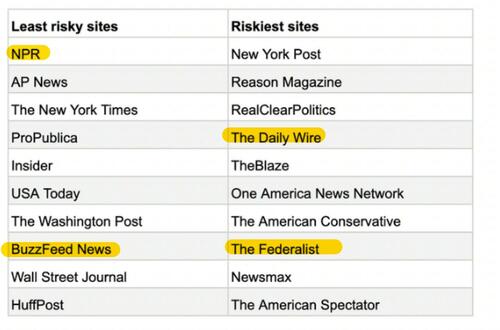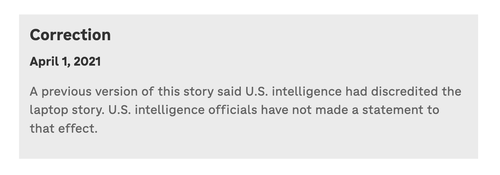Sue The Bastards: Taibbi's Take On Federalist, Daily Wire Vs. The US State Department
Sue The Bastards: Taibbi's Take On Federalist, Daily Wire Vs. The US State Department | ZeroHedge
........... In late October, the liberal anti-establishment investigative site
Consortium News filed a
historic suit against the United States of America and Newsguard Industries, describing a state-funded effort to
label, defame, and stigmatize “media organizations that oppose or dissent from American foreign and defense policy.”
Now, a pair of conservative media outlets,
The Federalist and The Daily Wire, have filed a bookend suit to match the Consortium News action. This time the defendant is the
Global Engagement Center, the State Department organization ostensibly dedicated to countering “foreign state and non-state propaganda.” Much as
Consortium News alleged the Pentagon funded Newsguard to censor its critics, the
Federalist/Daily Wire action alleges the State Department sponsored Newsguard and the U.K.-based Global Disinformation Index as “censorship enterprises” targeting domestic speech, in direct violation of its charter.
Although the 1947 Smith-Mundt Act barring agencies like the State Department from engaging in propaganda at home was “
modernized” through legislation passed in 2012,
the broad ban on intelligence or diplomatic services meddling in the domestic news landscapes remains. Even the “modernized” Smith-Mundt Act declares bluntly that no State Department funds shall be “used to influence public opinion in the United States.” Additionally, as the
Federalist/Daily Wire action cites, the law governing State Department conduct,
22 U.S. Code § 2656, says unequivocally that its mandate is limited to “matters respecting foreign affairs.”
For the State Department to fund organizations that up and down-rank domestic media organizations is a ludicrously obvious no-no.
“The State Department’s mandate to administer foreign affairs is clear, making its role in the censorship scheme doubly unlawful,” says Margot Cleveland, serving here as the New Civil Liberties Alliance attorney representing
The Federalist and
The Daily Wire.
What is the alleged “censorship scheme”? The suit outlines a number of issues, but the most damaging appears to involve the use of GEC as a mechanism to funnel money to various censorship-by-proxy organizations. One of those groups is NewsGuard, which in a recent press release said a goal of its subscription-based “credibility assessment” services is to “
systemically defund sources of harmful misinformation.”
I reached out to NewsGuard about this passage. If the company licenses a “whitelist” of “legitimate” sites with the express goal of cutting off “revenues to fake news sites,” aren’t they effectively engaged in a blacklisting service whose real aim is to target what it considers
illegitimate sites? Is there any reason, I asked, that this service should not be described as blacklisting? The company hasn’t responded, as yet.
GDI, meanwhile, says one of its goals is to “defund disinformation” and uses what it seriously calls a Dynamic Exclusion List — the most badly creepy euphemism since the Obama administration dubbed its “kill list” the “
Disposition Matrix” — to bleed news outlets deemed “morally reprehensible” or lacking “redeeming social value” of ad revenue. The company also drew up lists of “least risky” and “riskiest” news outlets that seem to contradict its stance that it does not target “information about which reasonable parties may agree, such as varying political views.” Notice any patterns below?

Highlighted above are both the plaintiffs in this case and unusual entries on the “least risky” side.
Now-dead Buzzfeed blazed real trails in disinformation by publishing the Steele Dossier, which it knew was not only “unverified,” but “
contains errors.” Meanwhile there are interstate gas stations whose lavatory wall writings are more reliable than
HuffPost, which for years now has been jumping on obvious fake news tales like the pee tape with the enthusiasm of a dog humping a leg:

The oldest-in-America
New York Post, which published a correct Hunter Biden laptop expose
by Miranda Devine, was
deemed riskiest according to GDI. Meanwhile, papers that published the absolutely bogus lie that the report that the “
alleged” laptop was “
possible” Russian disinformation, or even had to publish corrections on that score, were put on safe island. Here for instance is an NPR fine-print
oopsie:

NPR is also racking up a fairly extensive record of reports relaying official statements later proven incorrect, like that
all 13 of the Ukrainian soldiers on Snake Island were killed or that “
breakthrough infections might not be a big transmission risk.” I asked GDI if it only counted non-official errors when it computed its reliability scores. They too have yet to comment.










